10 Scandals That Completely Rocked The Campbell Soup Company
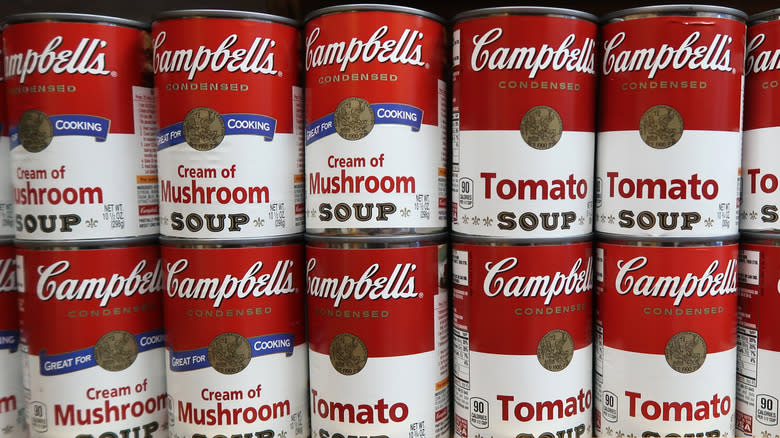
Founded in 1869 by Joseph Campbell, the company we know today as Campbell's has delivered steamy meals for over a century and a half to families all over the world. A trusted purveyor of canned goods, Campbell's makes more than just soups: It also produces chilis, ready-made snack bowls, and much more, including subsidiaries that offer an even wider variety of foods.
In its long history, however, Campbell Soup Company hasn't always boasted soupy smiles. Some of those issues involve faulty products or marketing campaigns that crossed a legal line. But no matter what the issue was -- whether it was a minor kerfuffle or a major scandal -- the brand has been caught up in controversy seemingly every few years making the news for all the wrong reasons. From ill-advised tweets to false advertising and union-busting efforts, this is a list of 11 scandals that rocked the Campbell's brand.
Read more: The Biggest Scandals To Ever Hit MasterChef
Environmental Damage Was Recently Alleged At Campbell's Ohio Plant
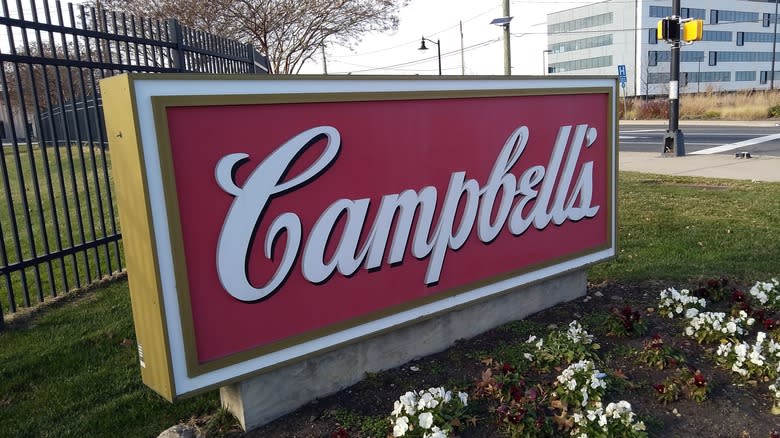
In the most recent case of Campbell's being caught up in controversy, the company was hit with a lawsuit in May 2024. But it wasn't an angry consumer or spurned retailer having a go at the brand, it was the United States government and local activists. Specifically, the Department of Justice and the groups Environment Ohio and Lake Erie Waterkeeper. Together, they accused Campbell's of being responsible for pollution found in Lake Erie in a pair of simultaneously filed suits in the U.S. District Court in the Northern District of Ohio.
The allegations involve toxic algae that have long caused problems in Lake Erie, according to Lake Erie Waterkeeper Sandy Bihn (via Environment America). "Campbell Soup's persistent violations of its legally mandated limits on discharges of phosphorous and other organic pollutants are only making the problem worse," Bihn says. As a result, they say the company committed a litany of violations of the 1972 Clean Water Act. Now, the government is seeking to have Campbell's update the plant responsible for the pollution.
"Installing a modern wastewater treatment system to end its Clean Water Act violations is nothing less than what Campbell's millions of loyal consumers would expect," explains Environment Ohio's Clean Water Program Director John Rumpler. Worse still, the company was allegedly aware of the problem for years but made no effort to solve it. In a statement to Axios, a Campbell Soup spokesperson asserted, "We will continue to take immediate action to address this and have capital investments planned to resolve this issue permanently," adding, "We will continue to work with regulators and other stakeholders to improve our operations and comply with all environmental regulations."
Contaminated Baby Food Brought A Subsidiary Into The Spotlight
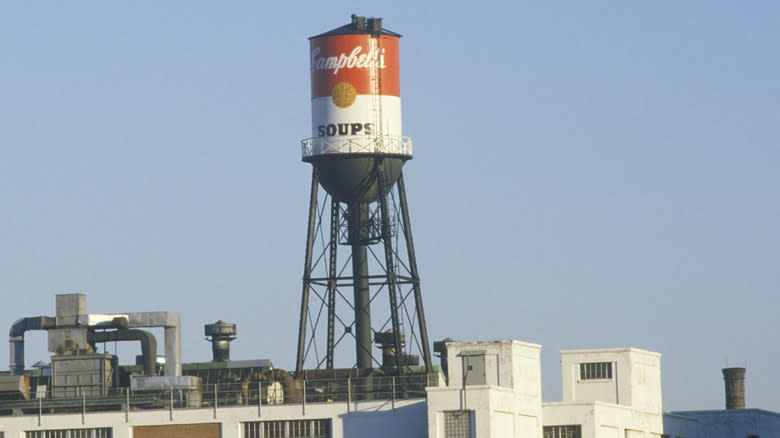
Keeping food free of contaminants is critical when manufacturing food, and it's something that Campbell's has to be especially careful of as a maker of canned goods. In 2021, though, the company was rattled by scandal over contaminated jars of baby foods from one of their subsidiaries, Plum Foods. A class-action lawsuit claimed that toxic heavy metals were detected in containers of the organic baby food.
Campbell's spokesperson Thomas Hushen denied the allegations flatly, standing behind the quality of the product. The suit stemmed from a congressional report that made mention of baby food hiding "dangerous levels of inorganic arsenic, lead, cadmium, and mercury," according to U.S. Rep. Raja Krishnamoorthi, reports the Courier Post. Within a matter of months of the suit being filed, the case was dismissed on October 31, 2021 by Judge Noel L. Hillman of the U.S. District Court for the District of New Jersey.
In his dismissal, Hillman asserted that the suit lacked proper standing, meaning that they didn't really have much of a case because they weren't making specific enough allegations. History repeated itself three years later when another lawsuit, filed in California against Plum, was also dismissed for similar reasons.
A Political Controversy Erupted That Got Campbell's In Hot Water
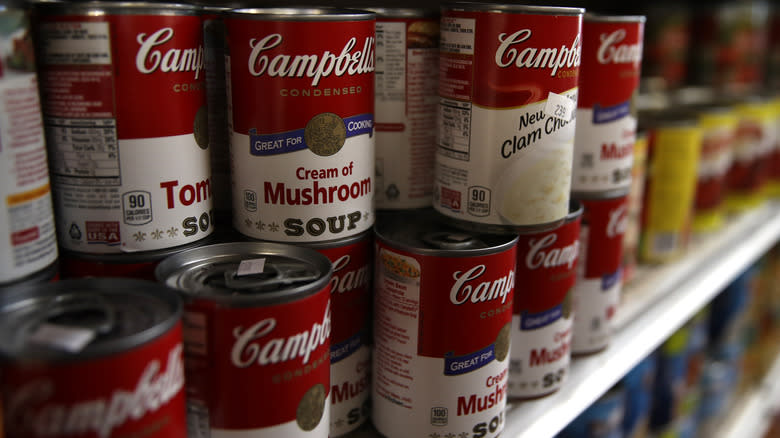
Campbell Soup Company caught serious flack from one side of the cultural aisle in 2017. Former United States President Donald Trump inadvertently dragged Campell's into the mud when he refused to denounce the action of Neo-Nazis at a hate rally in Charlottsville, North Carolina where a White Nationalist attempted to kill antifascist protesters with his car.
In the aftermath, several members of Trump's American Manufacturing Council resigned over the remarks Trump made regarding the rally, including CEOs from Merck, Johnson & Johnson, and General Electric. But when Campbell's CEO Denise Morrison stood her ground on the council, critics of Trump hit back, accusing the company of endorsing White Nationalism, and more broadly, President Trump's stance on minority groups, including his infamous comments about Mexican immigrants.
Campbell's struck back against its critics, though, stating that -- while it may not condone 45's comments -- Trump was still the President of the United States and it believed in his Manufacturing Council. "We believe it continues to be important for Campbell to have a voice and provide input on matters that will affect our industry, our company, and our employees in support of growth," the company said in a statement addressing the controversy. The council was disbanded mere days later.
It Was Hit With Allegations Over False Advertising
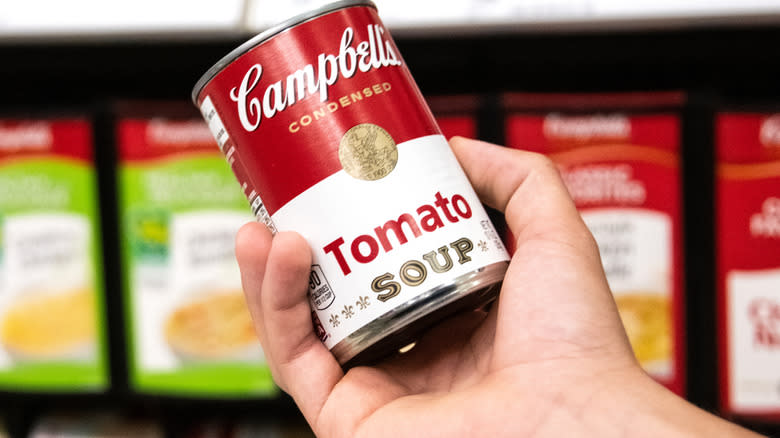
Some of Campbell Soup's biggest scandals have come in the 21st century, but it wasn't squeaky clean in the 20th, either. Far from it, in fact. And back in the 1980s, the company was under fire more than once, with one notable incident coming in 1987 when the National Cancer Institute expressed dismay over the company's claims of its product's health benefits. Specifically, an ad campaign for Campbell's Homestyle Bean Soup included a message from the NCI about fiber's role in reducing the risk of cancer while touting the high fiber content of the soup.
Though many other brands were making similar claims, Campbell's went a little too far, because the NCI hadn't given them approval to make such claims. When the organization responded they asked Campbell's to remove the statement and said that the real issue had nothing to do with fiber at all. In the letter, the NCI points out that the Homestyle Bean Soup would "contribute more sodium in a serving than we feel is in concert with HHS Department of Health and Human Services guidelines," according to the Orlando Sentinel. The NCI advises a serving of soup contains 600 to 700 milligrams of sodium, an amount they deem to be "excessive."
Some companies used the connection between fiber and reduced risks of cancer effectively. But, the National Cancer Institute demanding the company strip its commercials of those same claims couldn't have put a good taste in consumers' mouths.
A Company Exec Tweeted Debunked Conspiracy Theories
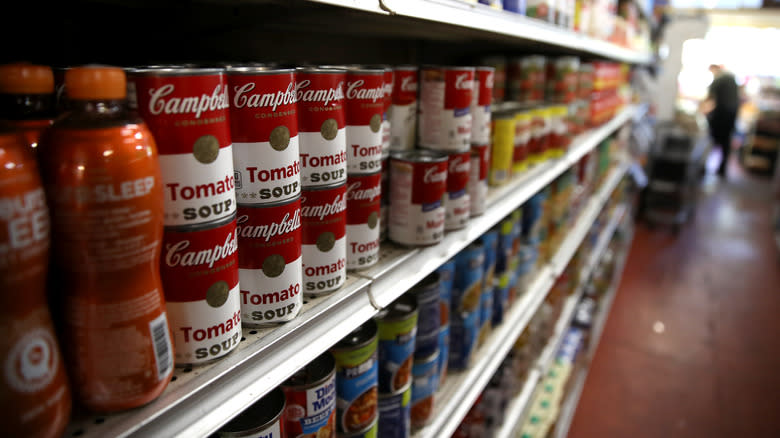
When a brand is caught up in controversy it's not always about its products themselves, or even company policies -- sometimes it's about the people themselves. And that was exactly the case in 2018 when a high-ranking Campbell's executive took the company down with him when he caused controversy over a tweet. Doubling the facepalm was that the tweet in question was overtly political. But the tweeter in question was Kelly Johnston, Campbell's Senior Vice President of Government Affairs (yes, that's a real position that exists).
Johnston, who also served as the Secretary of the United States Senate in the 1990s, reposted a well-known and thoroughly debunked conspiracy related to so-called 'immigrant caravans.' That conspiracy theory also harbored anti-semitic undertones as it baselessly linked billionaire industrialist George Soros -- who is often the center of various conspiracy theories -- to a supposed plot involving large numbers of Honduran refugees that were on their way to the United States. Despite being a personal remark, Johnston's high rank at the company forced Campbell's to do damage control -- especially as Johnston's tweet came on the same day that a bomb was found at Soros' residence.
The company issued a statement reminding consumers that Johnston's posts on social media were his own and not reflective of the company's beliefs. Nevertheless, within weeks Johnston had stepped down from the company. Campbell's insisted he was on his way out anyway, and the scandal merely sped up his departure.
Campbell's Went To War With Walmart
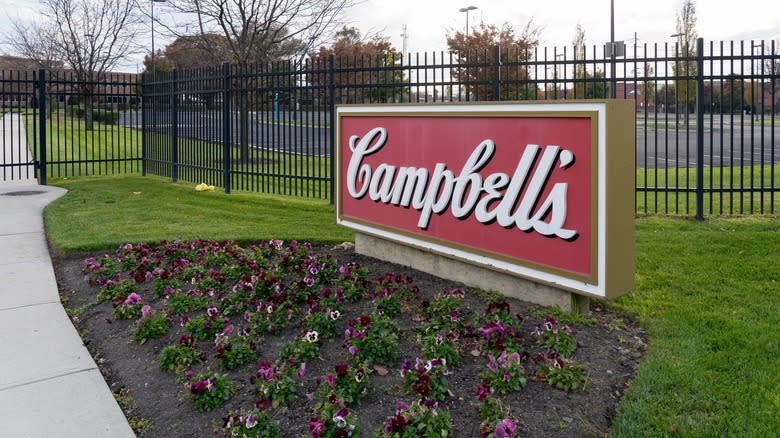
Campbell Soup Company has battled everyone from consumer watchdog groups and environmental activists to the United States government itself. But the company also got into a surprising fight with retail giant Walmart -- a global chain with more than 10,500 locations in 19 countries. But why on Earth would Campbell's decide to pick a fight with the very people who sell its products -- especially when it's one of the most successful retail stores in the world?
Well, by late 2017, trends weren't looking good in the canned soup category. Sales were declining across the whole industry, and this led to a sharp disagreement between Campbell's and Walmart, which sells a metric ton of soup for them. According to the Wall Street Journal, the two sides fought over the amount of shelf space that should be dedicated to Campbell's products. But they were also divided on store placement of the products and even pricing, a problem that plagued them for months. The conflict between the retailer and the soup maker dragged on into the following year, and it wasn't helping sales because they kept on declining. Ultimately, those cratering sales bottomed out in 2018 but finally bounced back a year later and the war with Walmart eventually petered out.
Campbell's Recalled An Entire Line Of Soup For Mislabeling
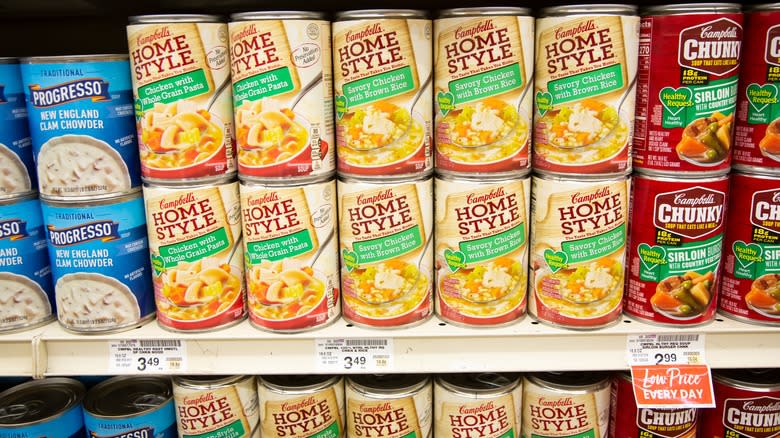
When a company has been manufacturing consumer goods as long as Campbell Soup Company, it's bound to encounter times when something goes wrong and a recall is needed. It's happened more than a few times in its century-and-a-half in business, but one of the most concerning in recent memory occurred in 2017. But it wasn't for the kinds of scary reasons that you often hear about regarding a food recall -- there were no dangerous chemicals found inside, nor outside contaminants of any kind. Instead, an entire line of soup was pulled from store shelves due to egregious mislabeling.
No, Campbell's didn't screw up the list of ingredients or misrepresent its product's health benefits. This time, it was a simple case of mistaken identity: Cans of Campbell's Homestyle Healthy Request Italian-Style Wedding Spinach & Meatballs in Chicken Broth soup were placed inside cans labeled Campbell's Homestyle Healthy Request Chicken with Whole Grain Pasta. Not the worst sin in the world -- it wasn't poisoning consumers or polluting rivers -- but when a labeling error is this bad, it erodes consumer confidence in the product. After all, how can a customer trust a company when it can't even deliver the product being promised?
In the end, the label mix-up cost Campbell's dearly, and not just in the trust department -- it was forced to pull back almost 4,185 pounds of product, according to CNN.
An Internal Fight For Control Of The Company Almost Unraveled The Whole Business
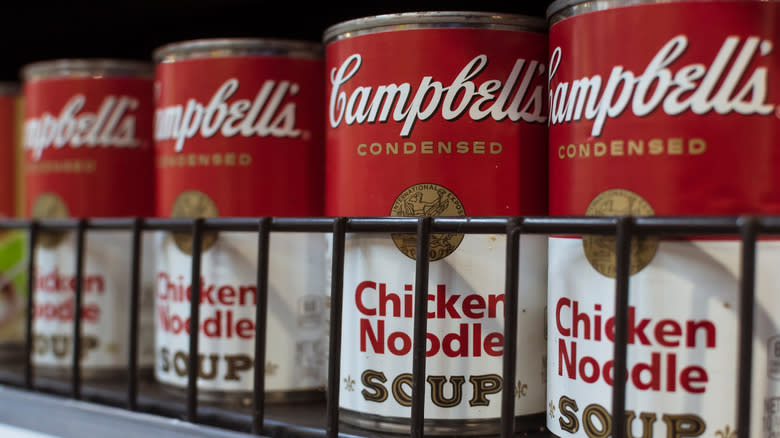
It wasn't a good year for Campbell's in 2018. The brand was still recovering from a massive product recall the year before; a high-ranking exec resigned in disgrace, and sales plummeted to their lowest point in years. Amid all that scandal, chaos erupted inside the company following an attempt by a notorious investor to take control of the 149-year-old business. And the fallout nearly destroyed everything that the Campbell family had built.
That investor was philanthropist Daniel Loeb, known for snatching up struggling companies and turning them around. He and his business Third Point were investing in Campbell's but during all of the 2018 trouble he decided to take more drastic measures, hoping to remake the board of directors in an effort to fix the company's problems. Eventually, Loeb and Third Point filed a lawsuit against the soup giant alleging that it was intentionally misleading investors. What resulted was a drawn-out proxy war within the Campbell's that sent stocks falling through the floor.
In the end, Loeb, Third Point, and Campbell's settled their dispute around Thanksgiving that year. In the deal, Loeb and Third Point agreed to end their proxy war and Campbell's agreed to increase the board of directors by two, adding a pair of executives of Loeb's choosing.
There Were Allegations The Company Worked With A Group With Terrorist Ties
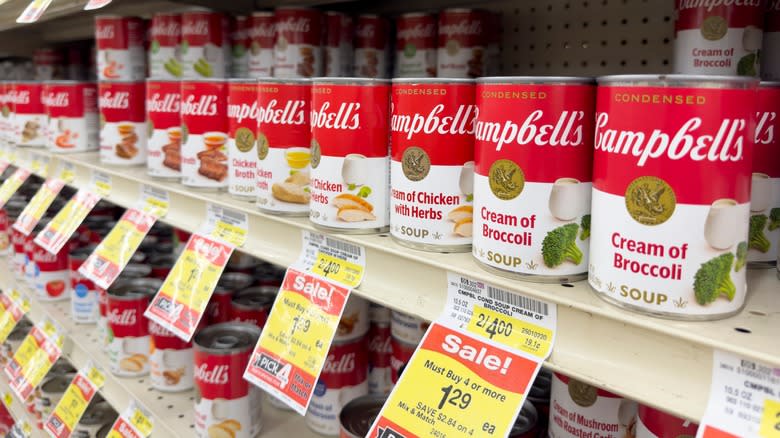
In the 2000s the global War on Terror kicked into high gear -- and even big business was forced to reckon with it. Every organization began scrutinizing its connections to investors, manufacturers, and contractors to make sure they weren't linked to individuals who might be involved in terrorism. Surprisingly, Campbell's was caught in that web when in 2010, one of its vendors was suspected of being linked to terrorist activities.
The allegations were leveled by far-right political activist Pamela Gellar, whose militant stance against Muslims are notorious. She's known for her Islamaphobia and she engaged in rampant fear-mongering and scare tactics pedaled by her book "Stop the Islamization of America," which argued that Arabs were trying to destroy the American way of life. Despite her obvious bigotry, people took notice when Gellar kicked up a media fuss about Campbell's use of the Islamic Society of North America to label their product as Halal -- similar to how foods are labeled as kosher.
Geller didn't have an issue with labeling soups Halal, but she did have a problem with the Islamic Society of North America's involvement. The issue is that three years earlier the organization had been named an unindicted co-conspirator in a 2007 terrorism trial that saw the Holy Land Foundation charged with sending millions to Hamas, the militant group that has been fighting Israel for Palestinian independence for decades and was labeled a terrorist group in 1997.
Jesse Jackson And Others Called For A Boycott Over Labor Rights
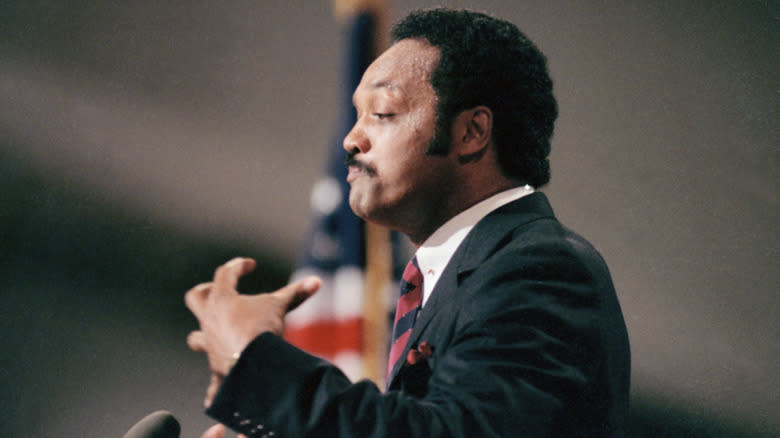
False advertising wasn't the only issue that plagued Campbell Soup Company in the '80s. Another key kerfuffle involved something arguably more important than its soup: Labor relations. It was in 1984 that political activist -- and then-candidate for the U.S. Presidency -- Reverend Jesse Jackson took a shot at the company, accusing them of union-busting efforts. Those accusations stemmed from its plant in Ohio where Campbell's was at odds with a group of farmers looking to unionize, and Jackson used his influence to back a boycott of Campbell Soup Company over the issue.
While the boycott didn't have much of a tangible effect on sales, the nascent farmer's union was confident that Campbell's was taking a hit with the public over it. ''They pour millions of dollars into promoting a certain image,'' said union organizer Baldemar Velasquez, who was also head of the Farm Labor Organizing Committee (per the New York Times). Velasquez and his supporters were seeking better working conditions, saying, "I know the boycott has affected that image.''
The whole affair hit a crescendo in September of that year when Jackson's appearance at the Democratic National Convention was coupled with protestors holding signs that took aim at Campbell's and its anti-union actions. Two years later, in 1986, the farmers won the fight, signing a historic three-year contract with Campbell's.
Read the original article on Mashed.

 Yahoo News
Yahoo News 